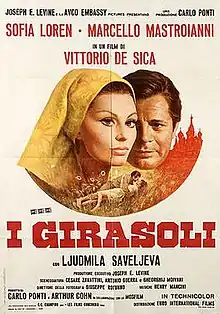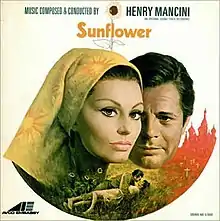Sunflower (1970 film)
Sunflower (Italian: I girasoli) is a 1970 Italian drama film directed by Vittorio De Sica. It was the first western movie to be filmed in the USSR. Some scenes were filmed near Moscow, while others near Poltava, a regional center in Ukraine.
| I Girasoli (Sunflower) | |
|---|---|
 Italian release poster | |
| Directed by | Vittorio De Sica |
| Written by | Tonino Guerra Giorgi Mdivani Cesare Zavattini |
| Produced by | Arthur Cohn Joseph E. Levine Carlo Ponti |
| Starring | Sophia Loren Marcello Mastroianni Lyudmila Savelyeva |
| Cinematography | Giuseppe Rotunno |
| Edited by | Adriana Novelli |
| Music by | Henry Mancini |
Production companies | |
| Distributed by | Avco Embassy |
Release date | Premiere:1970:03, March 13, 1970 (19) |
Running time | 101 minutes |
| Countries | Italy USSR |
| Languages | Italian Russian |
| Box office | $1,038,000 (US/CA Rentals)[1] |
Plot
"A woman born for love. A man born to love her. A timeless moment in a world gone mad."
Giovanna (Sophia Loren) and Antonio (Marcello Mastroianni) marry to delay Antonio's deployment during World War II. After that buys them twelve days of happiness, they try another scheme, in which Antonio pretends to be a crazy man. Finally, Antonio is sent to the Russian Front. When the war is over, Antonio does not return and is listed as missing in action. Despite the odds, Giovanna is convinced her true love has survived the war and is still in the Soviet Union. Determined, she journeys to the Soviet Union to find him.
In the Soviet Union, Giovanna visits the sunflower fields, where there is supposedly one flower for each fallen Italian soldier, and where the Germans forced the Italians to dig their own mass graves. Eventually, Giovanna finds Antonio, but by now he has started a second family with a woman who saved his life, and they have one daughter. Childless, having been faithful to her husband, Giovanna returns to Italy, heartbroken, but unwilling to disrupt her love's new life. Some years later, Antonio returns to Giovanna, asking her to come back with him to the Soviet Union. Meanwhile, Giovanna has tried to move on with her own life, moving out of their first home together and into her own apartment. She works in a factory and is living with a man, with whom she has a baby boy. Antonio visits her and tries to explain his new life, how war changes a man, how safe he felt with his new woman after years of death. Unwilling to ruin Antonio's daughter's or her own new son's life, Giovanna refuses to leave Italy. As they part, Antonio gives her a fur, which he had promised years before that he'd bring back for her. The lovers lock eyes as Antonio's train takes him away from Giovanna, and from Italy, forever.
Cast
- Sophia Loren – Giovanna
- Marcello Mastroianni – Antonio
- Lyudmila Savelyeva – Masha (Maria)
- Galina Andreyeva – Valentina, Soviet official
- Anna Carena – Antonio's mother
- Germano Longo – Ettore
- Nadya Serednichenko – Woman in sunflower fields
- Glauco Onorato – Returning soldier
- Silvano Tranquilli – Italian worker in Russia
- Marisa Traversi – Prostitute
- Gunars Cilinskis – Russian Ministry Official
- Carlo Ponti, Jr. – Giovanna's baby
- Pippo Starnazza – Italian official
- Dino Peretti
- Giorgio Basso
Release
The film was released on Saint Joseph's Day, 19 March 1970, in 5 key cities in Italy. It expanded to an additional 13 cities at Easter.[2] It was the first Italian film to be dubbed and screened at Radio City Music Hall in New York City.[3]
Reception
In its first 2½ months on release in Italy, it earned theatrical rentals of $1 million.[2]
Soundtrack
| Sunflower | |
|---|---|
 | |
| Film score by | |
| Released | 1970 |
| Recorded | 1969-1970 |
| Genre | Soundtrack |
| Length | 31:15 |
| Label | Avco Records |
| Producer | Henry Mancini |
| Review scores | |
|---|---|
| Source | Rating |
| AllMusic | |
SIDE A
01. Love Theme From "Sunflower" (2:26)
02. Masha's Theme (1:54)
03. Giovanna (1:54)
04. The Search (4:20)
05. Love In The Sand (Love Theme From "Sunflower") (3:00)
06. New Home In Moscow (1:20)
SIDE B
07. Two Girls ("Masha's Theme And Love Theme From "Sunflower") (2:07)
08. The Retreat (5:10)
09. The Invitation (2:04)
10. Masha Finds Antonio (Masha's Theme) (3:35)
11. The Parting In Milan (Love Theme From "Sunflower") (3:23)
Awards
- David di Donatello: Best Actress (Sophia Loren)
- Academy Award nomination for Best Music, Original Score
References
- https://ameblo.jp/ayumi-niwano/entry-12250852690.html?frm=theme
- "Avco Embassy's Graziosi Blueprints Plan To Perk Majors O'seas Distrib". Variety. 10 June 1970. p. 32.
- "New York Sound Track". Variety. 23 September 1970. p. 4.
- Sunflower at AllMusic. Retrieved 2020-01-13.
External links
- I girasoli at IMDb